'The Master': We Do Not Wish To Join Your Cult
by Maria Bustillos and David Roth
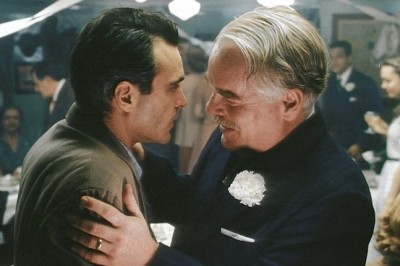
Maria Bustillos: I’m trying to parse all these Metacritic reviews of The Master. Mainly they seem to be saying, “I hate it, but I think I’m supposed to. A masterpiece.”
David Roth: David Thomson, in the New Republic, had a great first line. Which was “Well, at least it’s pretentious.”
MB: Yay? I’ll say this, whoever reconstructed M. Phoenix’s shoulders deserves a special Oscar. His bod is all Cubist, suddenly.
DR: It seems to me like this: a fine director made a mostly perfect-looking film, with an interesting musical score and fine performances. Except that it is also totally inert, with no real characters one can or could care about, no real sense of the world they live in, and doesn’t touch upon any ideas with pulses of their own.
MB: It looks amazing but my blood pressure still sank like a stone. 20/10 by the end.
DR: At the ArcLight in Los Angeles, someone comes around defibrillating people, I’m sure. They snap back to life like, “AAUUUUGHH IT’S BRILLIANT AND BRACING.”
MB: Fittingly enough, that theater is just a stone’s throw from the monstrous blue Scientology HQ. I worry that they have Beck Hansen tied up in there somewhere.
DR: There is nothing more LA to me than a second-generation Scientologist. Maybe if that person was also, like, wearing weird pants and taking pictures of the dumplings s/he’s eating in Monterey Park.
MB: I can’t tell you about their dumpling-photo habits. Us common or garden Angelenos just drive past their compound and shudder.
DR: It is, to be fair, a punishing building, like if a 1950s luxury hotel was also a prison.
MB: We had the usual ArcLight pep talk at the beginning. Water is now $4.50 over there. Maybe I became so grumpy because I was parched.
DR: Yeah, you want to stay hydrated while soaking in 70mm footage of Joaquin Phoenix acting feral, Phil S. Hoffman being orotund, and boats driving around, and period-appropriate haberdashery.
MB: At least the L. Ron Hubbard thing, I can tell you because I slogged through Dianetics, is not entirely inaccurate. Though I thought the movie kind of failed to capture the depths of Hubbard’s real sordidness. Maybe Philip Seymour Hoffman is too civilized a guy. Whereas L. Ron was a real troglodyte. Hoffman totally built his voice around the real Hubbard’s voice, though (start around 1:51).
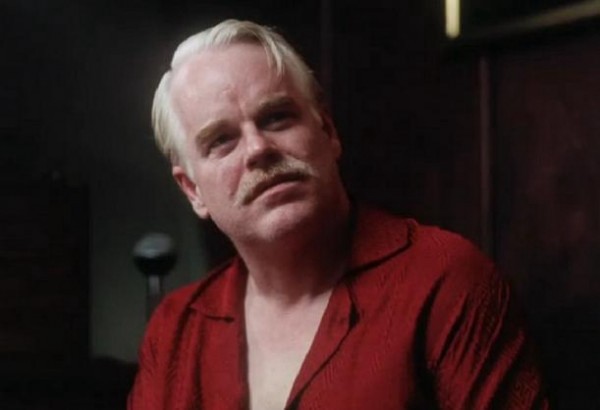
DR: The problem, for me, was that The Cause, which is the stand-in for Scientology, was never really graspable as either a philosophy or something else. It wasn’t good hucksterism or bad, and there was no real sense of what its appeal might’ve been, beyond Hoffman/Dodd/Hubbard.
MB: They were also missing the Art Theory part. Scientology kind of worships Art and Artists though they do not know Thing One about any of that. Like that terrible 19th-c. poem they slap on everything?
DR: Please share the poem. I always thought Scientology was more into celebrities than artists, and then wrote some sort of virtue back onto those artists’ success.
DR: Like how Ayn Rand thought Mickey Spillane was one of the great writers in the language and that Cyrano de Bergerac was the finest book ever written. It would be really interesting to know the artistic tastes of truly epically crass, self-interested people. Like, what’s Donald Trump’s favorite band?
MB: Here it is. It’s by Arthur William Edgar O’Shaughnessy.
“We Are the Music-Makers”
We are the music-makers,
And we are the dreamers of dreams,
Wandering by lone sea-breakers,
And sitting by desolate streams.
World-losers and world-forsakers,
Upon whom the pale moon gleams;
Yet we are the movers and shakers,
Of the world forever, it seems.
With wonderful deathless ditties
We build up the world’s great cities,
And out of a fabulous story
We fashion an empire’s glory:
One man with a dream, at pleasure,
Shall go forth and conquer a crown;
And three with a new song’s measure
Can trample an empire down.
We, in the ages lying
In the buried past of the earth,
Built Nineveh with our sighing,
And Babel itself with our mirth;
And o’erthrew them with prophesying
To the old of the new world’s worth;
For each age is a dream that is dying,
Or one that is coming to birth.
I particularly like the “deathless ditties” line, which has the same effect on my scalp as, like, eating a tablespoon of wasabi. The Scientologists quote this poem on half their literature.
DR: “With wonderful deathless ditties/We build up the world’s great cities” > “We built this city with rock and roll.” IT’S NOT CLOSE.
MB: I know, sign me up for ten billion years of indentured servitude.
DR: The images are arresting, though. “I just got together with all these creative people, and we were sighing, like creatively, and then all of a sudden there is this huge city.”
MB: Well, you have to write ditties first. Don’t let’s get ahead of ourselves.
MB: So, the movie? For what it’s worth, I thought the acting was fine, though as Anthony Lane said in the New Yorker: capital-A Acting.
DR: I was thinking about this. I didn’t necessarily sense the depth of vulnerability you usually get with Hoffman, which I would’ve appreciated, and which he usually brings to the (many) frauds he plays. But he at least communicates the restorative joy a certain type of grandiose person gets from a certain type of attention.
DR: Who would you cast as L. Ron Hubbard?
MB: I’d cast the young Gene Hackman but make him go to his most horrible incarnation. As for the Cause, you know, as depicted in this thing, it makes neither more nor less sense than Scientology does, from what I can make out.
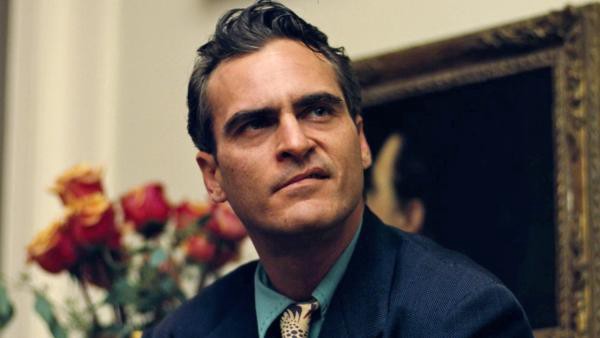
DR: Joaquin Phoenix, for his part, is maybe too good. Which is also a nice way of saying bad. His performance is so majestically gnarled that it’s kind of impossible to see or care about Freddie Quell as a human being. He is so perfectly feral.
MB: The Phoenix character is a stone psychopath. How come all these women are giving this obviously dangerous weirdo the come-hither?
DR: Yeah, it’s one thing to be into, like, bad boys or conflicted people. It’s another thing to be like “I’m going to let this guy, who is 145 pounds of clammy torment and screwed-down violence, take my top off.”
MB: The department-store model is taking off her bra and every woman in the audience is like what?! NO. GET OUT OF THERE NOW WHAT ARE YOU THINKING. I guess it was the Lysol cocktail he gave her. Can we talk about Freddie’s way with experimental hooch? Because you can’t drink paint thinner! Or Lysol! Not even a little bit!!
DR: It is an interesting bonding point. “You simply must make me another batch of that homebrewed poison of yours,” the suave, cultured cult leader says to the frank psychopath who moves like one of those inflatable tube men outside car dealerships. “You have access to whatever you want from the garage, or from inside of the car.”
DR: Although I guess there’s something to the power of shared appetites. Was Hubbard a lech? Because, although the script implied it, Hoffman’s Dodd didn’t really seem to have the usual Svengali’s wild fuck-appetite.
MB: I am not sure about Hubbard. He had those teenage Messengers, but from what I’ve read it doesn’t sound like it was really a harem situation?
MB: Did this whole thing kind of remind you of Charles Willeford? Because it did me.
DR: It was roughly that stank and poker-faced. There was a certain lack of humor, though.
MB: Those two things. This distanced horror-comedy, like the Hare Krishna’s broken finger. The casual brutality: David Lynch for example has your featured psychopath, but you get the sense that David Lynch knows/cares how awful this all is. In the case of Willeford, he takes great care to avoid judging the horror.
DR: Right, or Lynch knows it and is sort of kidding in some grotesque or distanced way. This was different. Paul Thomas Anderson can be very funny when he wants to be. But I think that in his two Crazy People Movies — which would be this and Punch Drunk Love, which I don’t really like all that much — he recedes a bit too much.
MB: Oh gosh, I loved Punch Drunk Love.
DR: There is also, for me, the question of just how crazy a protagonist a movie can stand.
MB: Pretty crazy, I think. Do you love Taxi Driver? Because I really do, though I am in no hurry to watch it again. Yikes.
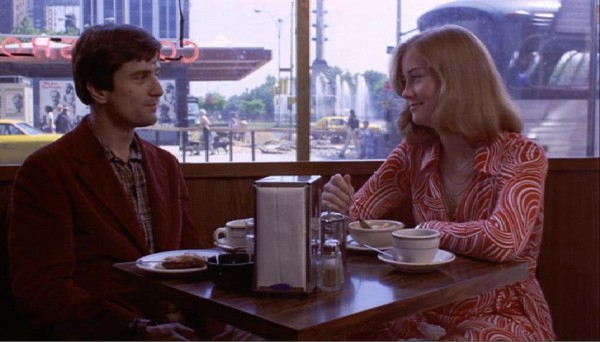
DR: I do love Taxi Driver. And that is maybe your maximum of inarticulate crazy person. But De Niro helped so much in that one, because you could feel how angry/sad/disgusted he was as he slipped away from himself and into his surroundings. Phoenix starts The Master pretty close to the edge, and never gets terribly close to humanity except when under hypnosis. If Anderson had cast a different actor than Phoenix or sought a different performance, there might’ve been some sort of recognizable humanity there that recedes or is subsumed; Phoenix managed that in To Die For, for instance. Instead the performance is 105% seethe all the time.
DR: Although the New York that surrounds Travis Bickle is so luridly and lovingly (it’s a very nauseous love) depicted. The bleak joke of that movie is how long and how well someone that damaged can fit into a New York City of extravagantly messed up people and, like, Tad’s Steaks with peep shows in them on every corner.
MB: Maybe that’s the bar Anderson was trying to reach. No soap, though.
DR: In The Master, the environs are very… art-directed. There’s no real sense of what 1950 was like or would be like for Freddie Quell or anyone else.
MB: That is SO TRUE, you can’t evoke a time on art direction alone.
DR: And this was good art direction. Period sweaters for dayz.
MB: They WAY overdid the ties also, which to me appeared more like 40s ties? Here is about the minorest quibble a person could have with a movie, I realize.
MB: But I did feel the lack of any sense of what a normal person’s day was like, from this movie; what was on the radio, who was frackin’ president. This whole thing takes place in a complete vacuum.
DR: Which, maybe given that it’s about a cult, you could say the claustrophobia is by design.
MB: Which like, it’s an Art Film so whatever its defects are going to be wallpapered over with this veneer of Artistic License.
DR: Right, exactly. “It’s lifeless and loveless. Which is surely the point.”
MB: There is also something very condescending about oh, these dumb “regular people” would obviously fill a lecture hall to hear P.S. Hoffman free-associate.
MB: There really needed to be an explanation of why Laura Dern, for instance, was so into The Cause, and there was a giant crater in the movie where that explanation would have been.
DR: And inside that crater: LONELY MEN have a hard time relating. All the women in the movie, all these great actresses are left doing so little.
This is what bums me out about Anderson’s ascent — if that’s the word — into his new and novelistic seriousness. There are GREAT parts for ladies in Magnolia and Boogie Nights. I was going to write “great lady parts in Boogie Nights” but the weight of the notional That’s What She Saids was crushing.
DR: And then as he’s sort of achieved this icy new virtuosity, and lost that shaggy Altman/90s Postmodern Novel approach, the women are sidelined. So that the men might scowl and not-relate better. And you lose a lot with that, not least because women are such a huge part of why men do anything.
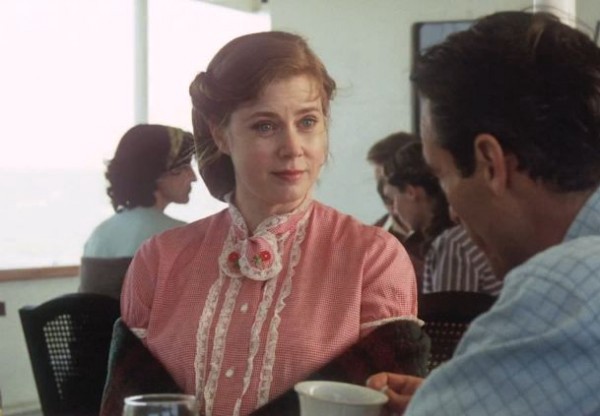
MB: I guess we are supposed to think that Amy Adams is kind of the prime mover of the whole thing? It’s like she’s the one guiding Hoffman, who is clearly completely bonkers but has all this charisma. How can she “believe”? I had no sense of her true position on his nonsense. “Which is by design,” right? Ugh.
DR: I would take Amy Adams out for a nice dinner and walk her all the way home even if she lived somewhere weird.
MB: The handjob scene was horrifying. Well, all the sex in this movie, which was constant and just bludgeoning, was horrifying.
DR: That is true. If I can recommend this movie to anyone without reservation, it would be to fans of gnarly unerotic sex. Be it with Twitching Tearful Beef Jerky Stick In Period Sweater Phoenix or anyone else.
DR: The handjob scene, we should explain at the risk of further spoilers, is when an Academy Award Nominee MILKS an Academy Award Winner into a sink while issuing vague but pointed ultimatums about the milkee not straying from marriage.
MB: Which milkee then basically collapses into the sink.
DR: SO HOT. I give it five boners. #MrSkin
MB: Also? That was really cheap how Anderson stole the mildly exasperated hand-wiping-after from “Mad Men.” Am I making that up?? I THINK NOT.
DR: Oh, did he? I just assumed it was a period detail. I haven’t read Dwight Eisenhower’s biography in a while. Sorry, imagery.
MB: Ack.
DR: The scenes that I thought were best in the movie involved that mimetic hypnosis that happens when people are hypnotized in movies.
DR: The first scene of Lars Von Trier’s Zentropa is a particularly obvious example of how this can work. It’s a cool feeling to be hypnotized by proxy, and fairly well pulled off during the first few scenes in which Hoffman audits/processes Phoenix. But that’s as illuminating or interesting as their relationship gets.
DR: And so the thing that should pull it along — Hoffman as discoverer or charlatan, Phoenix as someone who discovers or is hustled — is absent. Neither ever quite seems like someone who understands or even knows what he’s doing.
MB: “Which is by design”? because if so, whatever. Who is the sick one? etc., blah. It leaves way too much unanswered. Why do you think Hoffman refused to ditch Phoenix, when he was asked to by his fam? For example.
DR: No idea? In David Thomson’s review, he writes that the suggestion of a homoerotic subtext is more a result of empty space in terms of the characters than anything really suggested in their relationship. That it’s just two dudes hanging around thwarting each other and not-quite-communicating, to no end, over an extended period of time.
MB: I didn’t read a particle of homoeroticism in this movie? Is there a claim for that?
DR: Not in Hoffman’s final serenade of Phoenix? I thought it was somehow implied in the Punitive Amy Adams Handjob™, too.
MB: Hmm. Well, they wrestled, I guess.
DR: But yeah, I think mostly the relationship was impenetrable. If you’re inclined, then this is a director elegantly refusing to reveal too much. If you’re not, it’s more “these jerks, I think, are maybe going to fight?”
MB: I thought more like, Hoffman is a narcissist who just sucks up attention like a vacuum cleaner. And narcissists are really good at paying enough attention to rope you in; they choose people who pay close and good attention; either desperate people or really aware people, because the other person is the pool in which the narcissist can see his own reflection. Otherwise they don’t exist, even.
DR: So maybe there’s your truest Hubbard parallel in the movie, finally.
MB: That works, certainly.
Maria Bustillos is the author of Dorkismo and Act Like a Gentleman, Think Like a Woman.
David Roth writes “The Mercy Rule” column at Vice, co-writes the Wall Street Journal’s Daily Fix,, and is one of the founders of The Classical. He also has his own little website. And he tweets inanities!
